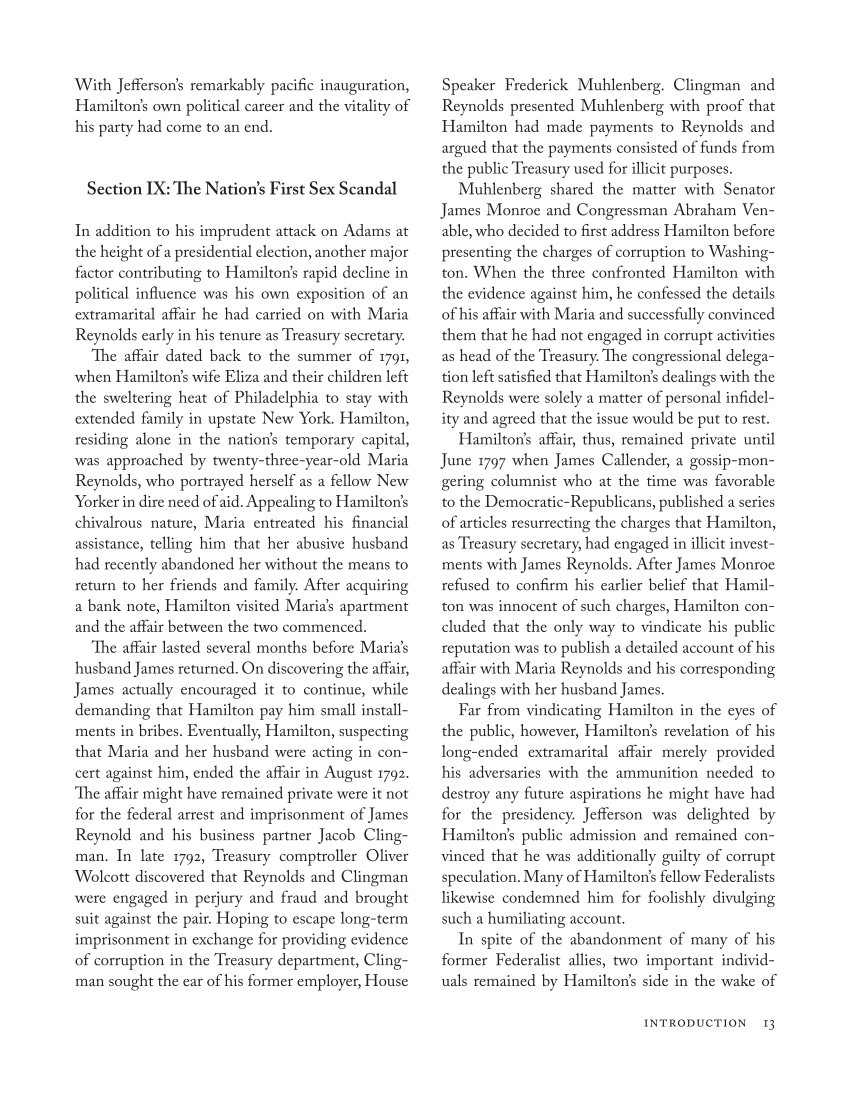I 13 With Jefferson’s remarkably pacific inauguration, Hamilton’s own political career and the vitality of his party had come to an end. Section IX: The Nation’s First Sex Scandal In addition to his imprudent attack on Adams at the height of a presidential election, another major factor contributing to Hamilton’s rapid decline in political influence was his own exposition of an extramarital affair he had carried on with Maria Reynolds early in his tenure as Treasury secretary. The affair dated back to the summer of 1791, when Hamilton’s wife Eliza and their children left the sweltering heat of Philadelphia to stay with extended family in upstate New York. Hamilton, residing alone in the nation’s temporary capital, was approached by twenty-three-year-old Maria Reynolds, who portrayed herself as a fellow New Yorker in dire need of aid. Appealing to Hamilton’s chivalrous nature, Maria entreated his financial assistance, telling him that her abusive husband had recently abandoned her without the means to return to her friends and family. After acquiring a bank note, Hamilton visited Maria’s apartment and the affair between the two commenced. The affair lasted several months before Maria’s husband James returned. On discovering the affair, James actually encouraged it to continue, while demanding that Hamilton pay him small install- ments in bribes. Eventually, Hamilton, suspecting that Maria and her husband were acting in con- cert against him, ended the affair in August 1792. The affair might have remained private were it not for the federal arrest and imprisonment of James Reynold and his business partner Jacob Cling- man. In late 1792, Treasury comptroller Oliver Wolcott discovered that Reynolds and Clingman were engaged in perjury and fraud and brought suit against the pair. Hoping to escape long-term imprisonment in exchange for providing evidence of corruption in the Treasury department, Cling- man sought the ear of his former employer, House Speaker Frederick Muhlenberg. Clingman and Reynolds presented Muhlenberg with proof that Hamilton had made payments to Reynolds and argued that the payments consisted of funds from the public Treasury used for illicit purposes. Muhlenberg shared the matter with Senator James Monroe and Congressman Abraham Ven- able, who decided to first address Hamilton before presenting the charges of corruption to Washing- ton. When the three confronted Hamilton with the evidence against him, he confessed the details of his affair with Maria and successfully convinced them that he had not engaged in corrupt activities as head of the Treasury. The congressional delega- tion left satisfied that Hamilton’s dealings with the Reynolds were solely a matter of personal infidel- ity and agreed that the issue would be put to rest. Hamilton’s affair, thus, remained private until June 1797 when James Callender, a gossip-mon- gering columnist who at the time was favorable to the Democratic-Republicans, published a series of articles resurrecting the charges that Hamilton, as Treasury secretary, had engaged in illicit invest- ments with James Reynolds. After James Monroe refused to confirm his earlier belief that Hamil- ton was innocent of such charges, Hamilton con- cluded that the only way to vindicate his public reputation was to publish a detailed account of his affair with Maria Reynolds and his corresponding dealings with her husband James. Far from vindicating Hamilton in the eyes of the public, however, Hamilton’s revelation of his long-ended extramarital affair merely provided his adversaries with the ammunition needed to destroy any future aspirations he might have had for the presidency. Jefferson was delighted by Hamilton’s public admission and remained con- vinced that he was additionally guilty of corrupt speculation. Many of Hamilton’s fellow Federalists likewise condemned him for foolishly divulging such a humiliating account. In spite of the abandonment of many of his former Federalist allies, two important individ- uals remained by Hamilton’s side in the wake of
Document Details My Account Print multiple pages
Print
You have printed 0 times in the last 24 hours.
Your print count will reset on at .
You may print 0 more time(s) before then.
You may print a maximum of 0 pages at a time.

























































































































































































































































































